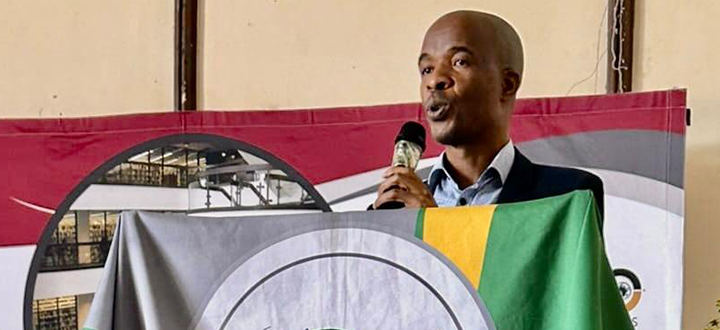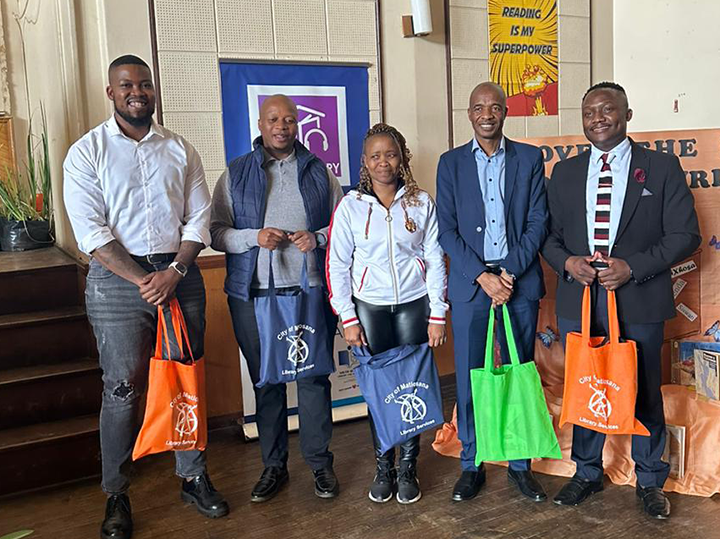
On 11 September 2024, the City of Matlosana Public Libraries, in collaboration with Unisa Midlands Region and Unisa Library and Information Services (LIS), hosted a thought-provoking book talk aimed at encouraging writing in African languages. The event brought together authors, educators, and young writers to have a robust discussion on the significance of writing in indigenous languages and its role in preserving the African culture.

Prof Mpho Ngoepe, Executive Director: Unisa LIS
Phehello Setona, Director for Community Development, opened the event with a heartfelt reflection on his personal connection to books, sharing how gifting books to family members during Christmas inspires the love for reading. His opening remarks set an optimistic tone for the day, that focused on fostering a culture of writing in African languages.
Dr Otshepeng Moletsane’s powerful speech on the importance of writing in African languages set the tone for the book talk. He emphasised that writing in one's mother tongue is not only an expression of identity but also a crucial means of cultural preservation. “Language is alive,” Moletsane asserted, inspiring young writers to take pride in their linguistic heritage and use their writing to celebrate and preserve their culture.
Moletsane also addressed the global challenges faced by African languages in the digital era, urging the audience to leverage technology in support of and sustaining these languages. He concluded with a call on the youth to embrace their native languages and contribute to the literary landscape through their writing.

(From left) Dr Otshepeng Moletsane, Phehello Setona, Pemla Ditsele, Prof Mpho Ngoepe and Karabo Lekalakala
Professor Mpho Ngoepe, Executive Director: Unisa LIS, explored the role of storytelling in cultural preservation and literacy. He highlighted that personal and communal narratives are foundational to effective writing. “People need to know where they come from to understand where they are going,” Ngoepe said, linking storytelling to the preservation of cultural identity.
One of the crucial points that Ngoepe raised in his address was the need to improve reading comprehension among young learners. He encouraged participants to develop a habit of reading, particularly in their native languages, to foster intellectual growth and critical thinking. Ngoepe also highlighted the case of Ouma Katrina, the last living speaker of the N/uu language, emphasising the importance of preserving languages through writing.
The event featured a lively Q&A session where participants discussed the role of libraries in the digital age and the need for more reading material in African languages for young readers. The panel underscored the importance of libraries as essential spaces for learning, complementing digital resources while supporting literacy development.
The discussion also addressed the scarcity of books in African languages, emphasising the need to fill this gap to sustain a reading culture. Prof Ngoepe urged writers to create engaging material that reflects the experiences of African readers.
Challenges in self-publishing were also explored. While self-publishing offers creative freedom, it often lacks the visibility and reach of traditional publishing. Ngoepe advised young emerging writers to build strong personal brands and cultivate audiences to overcome these challenges.
Pemla Ditsele and Karabo Lekalakala shared their experiences as writers, encouraging attendees to embrace their mother tongues and focus on their audiences in the self-publishing process. Ditsele emphasised the importance of valuing indigenous languages, while Lekalakala offered practical insights into successful self-publishing strategies.
The event concluded with a heartfelt vote of thanks from Setona, who praised the contributions of the speakers and attendees in promoting writing in African languages. He urged continuous support for initiatives that encourages and celebrates African linguistic and cultural heritage through writing.
The book talk at Matlosana served as a call to action for African writers to embrace their cultural identities, tell their stories, and ensure the survival of their languages through writing.
* By Itumeleng Mpete, Marketing Office, Department of Library and Information Services
0 Comments.